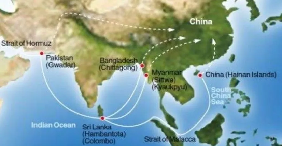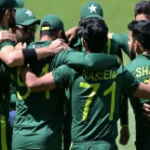How the geopolitical ground realities in Southeast Asia and the Indian Ocean region will change with a Marxist politician from an ultra-Leftist Janatha Vimukti Peramuna taking the rein of Sri Lanka? Is Beijing playing ‘weiqi’, a Chinese board game aiming to capture more areas than the opponent to restrict his movement and stop his maneuvre? Has China scored one more point in its ‘String of Pearls’ policy of encircling India from all sides by capturing small countries and areas around it?
Anura Dissanayake Visits India Before Election
India became one of the first countries to congratulate Anura Kumar Dissanayake after he was elected. He reciprocated the gesture by reiterating his commitment to strengthening the ties between the two countries and working towards enhancing cooperation for the benefit of the people and the entire region. But much before the Presidential Election, India invited him in February this year, he came, and met Foreign Affairs Minister S Jaishankar, other ministers and top officials.
India Bails Out Sri Lanka
When Sri Lanka went deep into the economic morass and met with the most severe economic meltdown in 2022, New Delhi rushed to extend a credit line of $4 billion in 2023, which proved to be the lifeline of the island nation.
With this amount, Colombo got a breather and could negotiate comfortably with the International Monetary Fund for the much-needed $3 billion bailout package. Sri Lanka reciprocated the Indian gesture by utilizing the first tranche of the $330 million bailout package to repay the Indian debt.
Cooperation Between Navies
The cooperation was extended to defense as the navies of the two countries joined hands and Indian ships like INS Batti Malv, INS Nireekshak, and INS Delhi docked at Sri Lankan ports.
Dissanayake Peeves India By Opposing 13th Amendment
When then Sri Lankan President Ranil Wickremesinghe visited India in April 2024, he agreed to ensure political autonomy to Tamils and assured to implementation of Amendment 13A, granting full power in all spheres, except police.
However, Dissanayake peeved India by opposing the 13th Amendment to Sri Lankan Constitution. The amendment ensures autonomy for the Tamil minority in the Eastern and Northern parts of the island nation.
Dissanayake Bats For Singhalese Nationalism
The leftist leader of Sri Lanka opposed the amendment and vowed never to implement it as his party the JVP had protested against it. Though Marxist parties try to address the issue of ‘oppressed sub-nationalism’, Dissanayake’s party opposes it because of its ultra-nationalist approach and the narrative it has created around it to win over the masses, that are predominately Singhalese and most of them Buddhist.
The Chinese Checker
However, political observers believe the Marxist president of the island nation may find it extremely difficult to resist Chinese pressure and oppose its hegemony. Anura Dissanayake will be happy to accept the dictates of Beijing for economic as well as political reasons.
Is China Playing ‘Weiqi’?
The analysts believe Beijing is playing ‘weiqi’, the board game aiming to capture more areas than the opponent to restrict his movement and stop his maneuvre?
The Malacca Dilemma
Though the Indian Ocean and Sri Lanka are vital for the geopolitical interests of China, the real problem lies somewhere else. The Strait of Malacca is the lifeline for China as it is the main sea lane used by Beijing for most of its exports and imports including that of crude oil. Coming under increasing pressure and attempts to contain it in the South China Sea, Beijing wants an alternative route. The Indian Ocean may fill this gap, however, China thinks and it has reason to think so, that the area is under the control of India.
China’s ‘String Of Pearls’
The experts in international relations believe China has adopted the policy of encircling India. It is trying to implement ‘String of Pearls’, a scheme of constructing and controlling ports around India in the disguise of its controversial BRI.
Chinese Projects Under BRI In Sri Lanka
Under its Belt and Road Initiative, Beijing has heavily invested in major infrastructural projects in Sri Lanka, including the Hambantota Port, Katunayake-Colombo Expressway, and the Norochcholai Coal Power Project.
Besides, it also wants to develop political ties with the island nation. In this way, China managed to gain leverage within the Sri Lankan political elites. Chinese President Xi Jinping visited Sri Lanka in 2014, and the two countries agreed to deepen the strategic and cooperative partnership.
Maritime Silk Road Initiative
Colombo has also become a part of the Maritime Silk Road Initiative, under which China can invest in infrastructural projects.
India can be upset with China’s port-building initiatives. While the ports of Hambantota and Colombo may serve as vehicles for the economic expansion of Sri Lanka, these may carry geostrategic and military importance for China.
China Wants To Control Indian Ocean
Though Beijing maintains that the Hambantota port is only for commercial purposes, no one can deny its strategic importance considering its closeness to the Indian shore. A strong foothold for Beijing in Hambantota, coupled with Gwador port in Pakistan would allow the country to dominate the entire Indian Ocean. It can also encompass the areas of Pakistan, Bangladesh, Myanmar, and Maldives, encircling India from all sides. Not only this, if Beijing manages to control this area, it would be able to dominate a vast area of the Indian Ocean from Australia in the east, to Africa in the west up to Antarctica in the south.
With a pro-China regime in Sri Lanka, China has set the alarm bell ringing for India.



